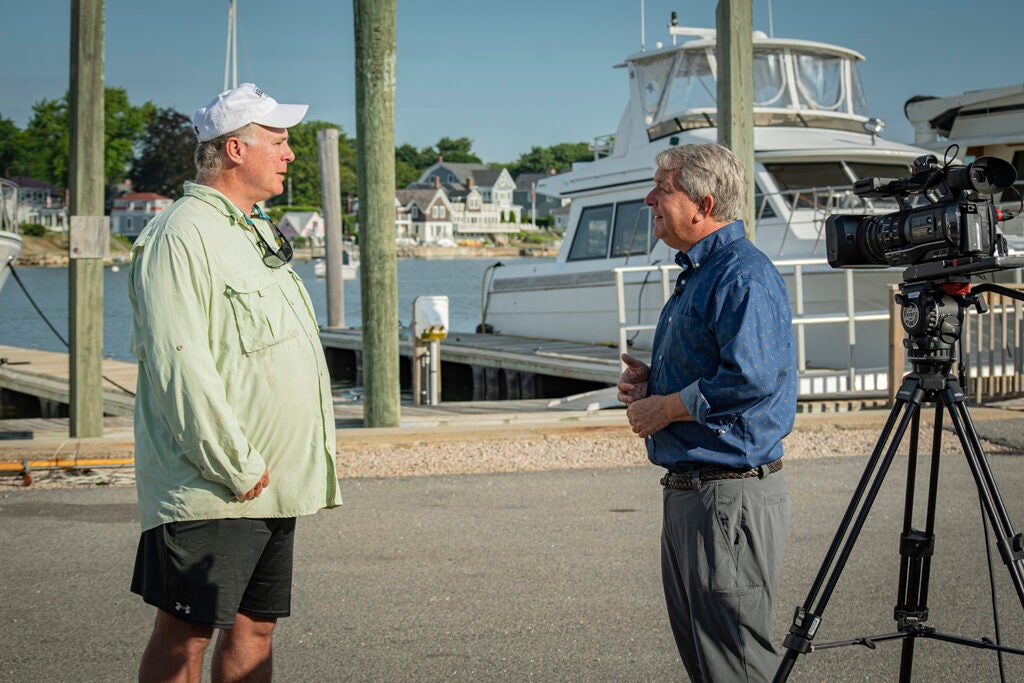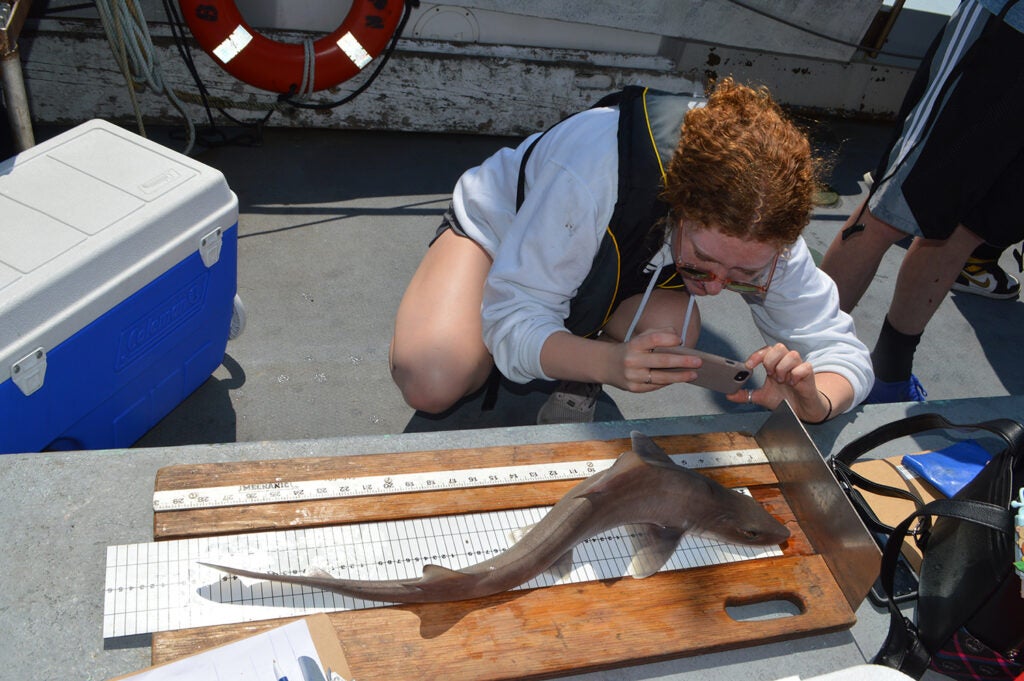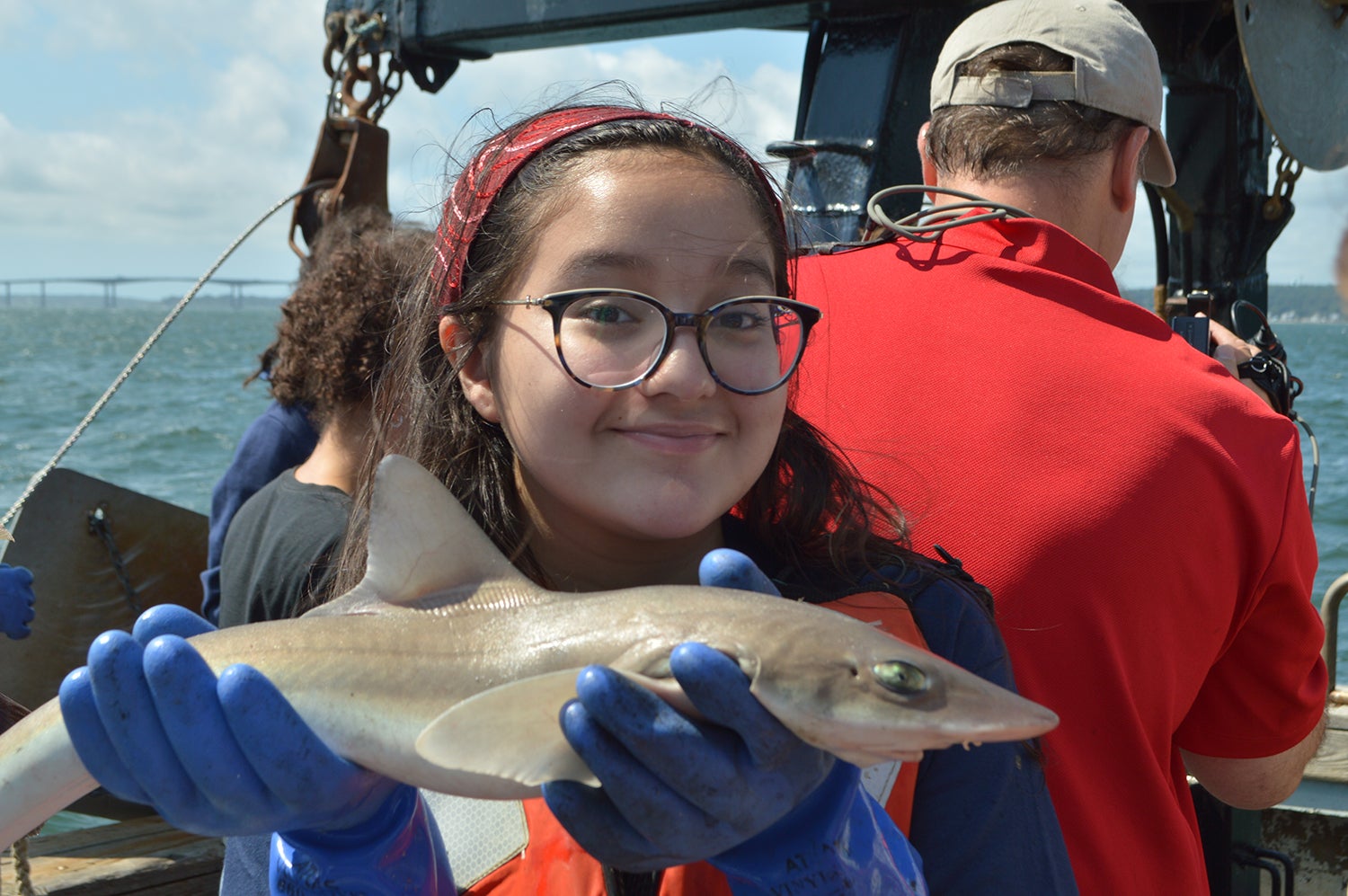NBC’s Today Show tags along for the ride
KINGSTON, RI – July 20, 2022 — A pair of white minivans rolls up on the dirt lot of Wickford Boat Yard. When the doors slide open, a dozen high school kids from Providence emerge, yawning and stretching as if it’s much earlier than 9 a.m. They make their way toward the University research vessel Cap’n Bert, which will take the group to two different locations to trawl for sharks and other marine life. Some of the students have never been aboard a boat for a saltwater expedition, and they seem a bit quieter than other members of the group.
Welcome to Shark Camp 2022, a week devoted to introducing kids to not only interesting fish but to the possibilities of a university education. Professor Brad Wetherbee, who teaches in the Department of Biological Sciences at the University of Rhode Island, founded the free Shark Camp in 2018. This is the first time the camp has run in two years because of COVID-19. This year’s group of 16 will bring the total number of participants to 48.

The program began when Wetherbee noticed that most years his first-year classes lacked diversity. “One of the reasons for this trend is obviously a lack of opportunities that they had when they’re younger. They just don’t have them. When we had the first campers, that was pretty obvious. These are kids from Providence. Some of them had never been to the beach before. They’ve never been on a boat for fishing. They’ve never even been to the ocean. That’s who we’re targeting, and the idea is to expose them to experiences they wouldn’t get otherwise. That’s the whole premise behind this.”

And this year, Shark Camp also welcomed Kerry Sanders and a crew from NBC’s Today Show.
“Here I am!”
Capt. Steve Barber pilots the boat to the first trawl location. The nets will descend to 20 to 40 feet for about 30 minutes, scooping up animals that get pulled in. Mitch Hazipetro, a research assistant in the URI Fisheries Center, explains how the nets work. Along with the high schoolers are URI students of Wetherbee’s, including Maricarmen Serna, from San Antonio, Texas, and Deanna Torres, from Bronx, New York. Both are marine biology majors, and on this trip keep a close watch on the students to keep them on task and for signs of seasickness. One passes out ginger candies, which have a reputation for calming stomachs.
Meanwhile Ariana Elysee, a rising junior at the Met School in Providence, a charter high school with a large minority population, wears large round glasses and talks about how she came aboard. “I’ve been out on the water before. I’m really interested in marine biology,” she said. “My counselor heard about this camp and told me it might be a good idea, and look: here I am!”
Eventually the cables are reeled up, revealing a squirming bundle of life hanging from the now teardrop-shaped nets. A mix of water and hundreds of squirming fish drop into a rectangular tub. Some of the students stare at the swirling mass hesitantly, while others immediately drop to their knees to grab individuals from the tub, which includes small sharks. Research assistant Hazipetro keeps up a running patter of information about the catch, including fish names, their habits, and fields innumerable questions that arise as the kids grow more confident about grabbing fish, until each of them have had a chance to examine the catch.
“Some things you should know”
Mateo Munoz Gil knows how the students feel. He was also once a student from Central Falls High School, a Colombian immigrant still working on his English. A student counselor heard about the program and suggested it might be a good opportunity to work on his English while also being exposed to the university experience. The result? “It was one of the best experiences I ever had.”
Most of his group, like today’s (July 12), had no idea whether they would be going to college. That changed when he went through Shark Camp. “Once I came here, I fell in love with the University. The people here were just so nice. I’m a very curious person, and they had an answer for every question I had. They explained answers to any question so well that you just get it right away.”
He is now a chemical engineering major at URI, and he urges others to take advantage of the camp as well. “I would definitely recommend it to anyone who hears about this camp because it’s such a wonderful experience. It teaches patience, and teaches about science, biology. Everything.”
That sort of reaction doesn’t happen by accident. Wetherbee brings the campers on a tour of the Center for Biotechnology and Life Sciences Building where they see different labs. Vice Provost Dean Libutti talks to them about going to college and the process of applying. “It isn’t only URI, but we just tell the kids if you’re thinking of going, here are some things you should know.”
Sharks are the bait
Wetherbee says while visiting the Cap’n Bert and places like Mystic Aquarium and the URI campus, the students are learning about how to decide whether they should go to college. “A lot of people in their families have never been to college. They don’t know about college. A lot of the thinking is that if you go to college to major in biology, you’re going to be a doctor. That’s very common. There’s little awareness of environmental science or animal veterinary science or wildlife conservation, all these different majors that are related, including marine biology. So that’s the idea, to get them here with the bait of sharks. And then when they’re here, they’re learning about sharks but they’re also learning about college.”
“I’ll work at Shark Camp one day”
Capt. Barber steers the boat to a different location. Once more he and Mitch Hazipetro lower the nets, this time to 45 to 60 feet. After the prescribed time, they raise the net. For this round, though, there is no hesitation: students crowd around the tub, not caring about the water that splashes them as the catch is released. While much of the fish are the same as the previous result, there are newcomers that rise from the deep: lobsters, large sea robins, “doormat” sized flounder. The kids are calling to one another to see what they have, and there is much talk and laughter.
Nyjaeh Deburgo is a rising high sophomore at the Met School whose teacher told him about shark camp. The steady breeze blows his curly hair around, and he sports the fuzzy attempt at a mustache befitting a young man. “It’s a long day, but I feel more comfortable about the fishing now,” he says. “Dogfish have a special place in my heart. Doing this has made me want to go to URI, and I’d like to work at Shark Camp one day.”
Sara Lataille is a shark camp alumna and knows the feeling. “I went in 2017, and I felt that it opened my eyes to marine biology. When I went to high school, I didn’t really think of doing marine biology as a career. I thought about areas like law, working with dogs and cats, but I was never really interested in those.” Lataille is a marine biology major.
“If I hadn’t gone to camp, I think I would have been on a different course. I’m glad that I was a camper. I’m glad that I realized what makes me happy and found something that I want to do as a career. It’s awesome.”
Learn more about the genesis of Shark Camp and URI students’ involvement in the program.
This release was written by Hugh Markey.

